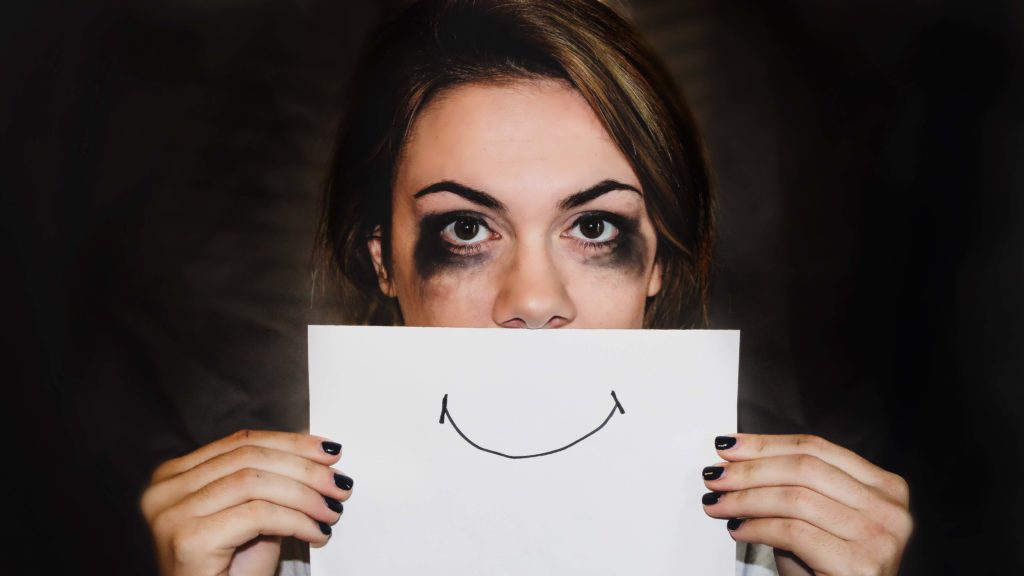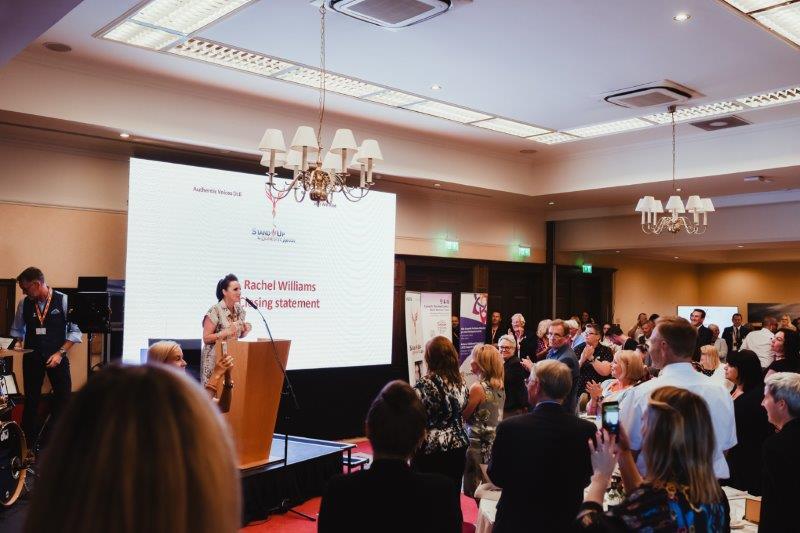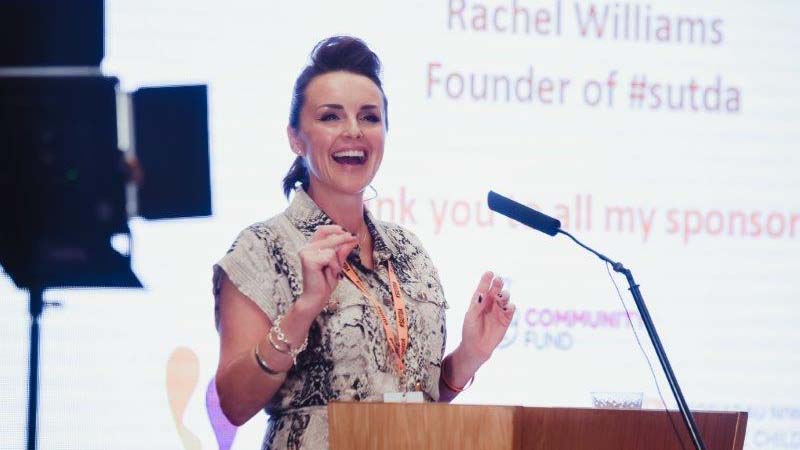Since lockdown, the number of women killed by men has doubled in the UK with police suggesting many might be suffering domestic abuse in silence. How is a former victim making their voices heard?

Lying on the floor in pain with a gun pointing at her, Rachel Williams thought she was about to die.
“Love me!” her ex-husband, Darren Williams shouted hysterically accompanied by a loud, dreadful “bang”. He fired the gun.
The bullet hit one of Rachel’s legs she’d pulled up in time to protect her chest. Before losing consciousness, she was beaten up for another few minutes, with the gunshot wound continually bleeding. The last thing she remembered was him rushing out of the place.
A few days later, the police found Darren’s body after he committed suicide whilst Rachel was recovering and protected in the hospital.
The nightmare, 18 years of the abusive relationship, was eventually brought to an end.
“It was a massive relief to me,” said Rachel, 48, from Newport. Trapped in a toxic, coercive relationship, she could fully understand the fear of uncertainty when living with an abusive partner.
“Domestic abuse of violence is like carbon dioxide poisoning. You can’t see it, smell it, and taste it. You just know it’s happened when it’s happened,” she said.
However, the tragedy had not come to a full stop, just six weeks after the shooting, one of her sons, Jack, subsequently chose to end his life. “It was nine years ago,” said the mother of two. “You never get over it. You just learn to live with it.”

Image: Stand Up to Domestic Abuse.
Since then, a desire to become the voice of those suffering from domestic abuse has sprung up in her mind. “Jack’s death won’t be in vain. I want to speak to raise awareness, to campaign, to lobby the government for change,” said Rachel, who is currently a qualified independent domestic violence advisor and the founder of Stand up to Domestic Abuse.
Over the past six years or so, she has worked tirelessly to hold up conferences, launch petitions, and participate in counselling services. Even now in lockdown, she’s still running the campaign by meeting with experts and victims remotely. But what truly concerns her is the self-isolation measure recently imposed against the coronavirus outbreak.
“In the domestic abuse arena, we always say, when you’re in that relationship, it’s like you’ve got constant walking on eggshells,” said Rachel, adding: “Now in lockdown, that would be like walking on broken glass because you’ve got no respite, you’re just imprisoned with this perpetrator.”
According to the National Domestic Abuse Helpline run by Refuge, the number of calls has increased by 25% since the lockdown began, and on the first Saturday following lockdown, the helpline saw a 65% surge of calls in comparison with the same day of the previous week.
In contrast, the police in Wales saw a significant fall in reports of domestic abuse in March. This could give the public an alarming message that most victims are probably bearing the abuse in silence.
Additionally, a project conducted by Counting Dead Women reveals that the UK has seen 18 females who were killed by men under suspected domestic violence this month, a figure that has doubled after the stay-at-home policy was introduced.

“We understand the additional fear self-isolation and social distancing may have for a victim of violence and abuse,” said Leonie Roberts, the spokesperson of the Welsh government, noting that victims are facing a more difficult situation where there is no distraction for them to temporarily escape from the violence.
“In normal times you might have somewhere to go – whether that was going to college or university, or your job, seeing friends and family, attending hobbies or activities. Now things have changed, you may feel that you have no one to turn to,” she said.
But “You are not alone, there is help available to you and we encourage you to reach out”. Ms Roberts highlighted that specialist services are all still open to those in need, ranging from general support to self-accommodation.
On 16th April, the Welsh government launched the Live Fear Free helpline to provide free consultation for victims who are searching for advice on how to stay safe at home or plans for leaving.
Ms Roberts said, “If you’re in danger in your home, you will not be fined or arrested for leaving the house. Domestic abuse services in Wales are open and can help you leave safely.”
Meanwhile, considering the difficulty of making calls under perpetrator’s supervision, the authority is promoting “silent” methods for seeking help, including text, web-chat, and email, accessible for victims unable to speak.
The officials are also urging local communities to watch out for their neighbours, particularly in this challenging time, people are encouraged to be aware of the possibility of violence in other households and report to the police if necessary.
“Don’t be a bystander,” Rachel said. “The figures for crime are going down because nobody is reporting where it is before.”
With considerable support, survivors who turned into advisors like Rachel are empowered by the Welsh government and police officials to join services and deliver valuable insights on how the existing measures and resources should be improved.
“I’m quite proud of Wales because I think we are ahead of the game with domestic abuse and violence,” said Rachel, who hosted the first survivor-led conference last year in Wales with over 300 professionals and survivors in attendance.
“What I love about Wales is the police, and the assembly members,” she said, revealing that the authority tends to involve former victims in the battle against domestic abuse. “They want to listen to experts by experience and know what we’ve got that can help shape future services to fit the victim’s needs. They want to get it right.”
She added jokingly, “I’d rather be Wales suffering domestic abuse and violence than in England.”

Image: Stand Up to Domestic Abuse
But no matter how much effort these passionate campaigners and officials have already made, there is always more to be done.
The lack of refuges for victims remains a huge problem in Wales, with 512 families turned away from the request from March 2017 to March 2018. And during the pandemic, most of the current funding has mainly gone on coronavirus-related aspects.
Therefore, campaigners are now pushing the government to cooperate with local authorities to provide families on standby with self-contained properties in their communities, so that the victims can still have alternative places to stay.
Meanwhile, some are blaming Coronavirus for deteriorating domestic violence due to heightened anxiety and depression. But Charlie Webster, the survivor and podcast broadcaster, wrote on The Telegraph, “Domestic abuse has nothing to do with the coronavirus.”
The lockdown is not causing it. But it is shining a big fat spotlight on a major problem in our communities. Victims of domestic abuse were already living in captivity before this happened.”
Although it seems to be the most hopeless time ever in terms of relentless suffering for those cooped up with the perpetrator, “there is still life after domestic violence,” said Rachel, who went through countless darkest nights, now standing up for the vulnerable and having a lovely family with her eldest son and husband.
“It is frightening when you first leave, but you can build your life back up again. You can have a better life than you’ve ever had before. I am a testament to that. And you can make your own choices, you know, life is precious, but freedom is priceless.”
She then encouraged people not to hesitate to ask for help in self-isolation, as substantial resources are close at hand and many professionals in Wales are well-prepared to come to victims’ rescue.
“The police forces are making it a priority and are getting that strong message out that they will come to your house regardless of COVID-19.
“They will come through your door,” she repeated, with a reassuring smile.
For more information about Rachel Williams, visit Stand up to Domestic Abuse. If you’re searching for help in Wales, contact Live Fear Free helpline or Welsh Women’s Aid.
